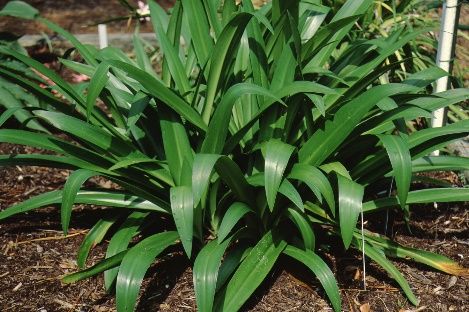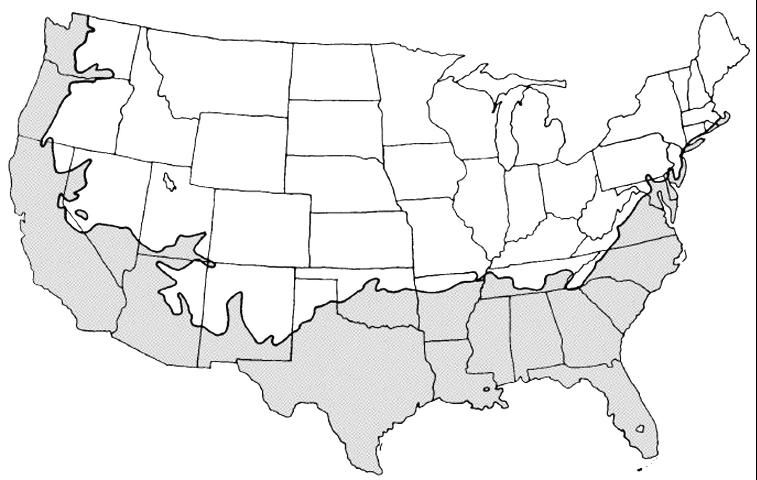Introduction
The swamp lily is a herbaceous perennial native to the southeastern U.S. that rises from a 3 to 4½ inch thick, fleshy bulb. The linear, leathery leaves grow in a rosette. These glossy leaves are bright green and reach a length of 1 to 4 feet. White or pink-striped flowers sit atop a succulent, cylindrical flower stalk that is 1 to 3 feet tall. A 6inchlong floral tube bears six petals and sepals, and rosy stamens that are tipped with yellow emerge from the throat of this tube. These striking, fragrant flowers appear in the spring, summer and fall seasons of the year. The fruits of the swamp lily are lobed seed capsules that are 1 ½ to 2 inches thick.

Credit: Edward F. Gilman, UF/IFAS
General Information
Scientific name: Crinum americanum
Pronunciation: KRYE-num uh-mair-rick-KAY-num
Common name(s): string lily, swamp lily, seven sisters
Family: Amaryllidaceae
Plant type: perennial; herbaceous
USDA hardiness zones: 7 through 11 (Figure 2)
Planting month for zone 7: year round
Planting month for zone 8: year round
Planting month for zone 9: year round
Planting month for zone 10 and 11: year round
Origin: native to Florida
Invasive potential: not known to be invasive
Uses: mass planting; specimen; accent
Availability: somewhat available, may have to go out of the region to find the plant

Credit:
Description
Height: 1 to 2 feet
Spread: 1 to 2 feet
Plant habit: spreading
Plant density: open
Growth rate: moderate
Texture: coarse
Foliage
Leaf arrangement: spiral
Leaf type: simple
Leaf margin: entire
Leaf shape: linear
Leaf venation: parallel
Leaf type and persistence: evergreen
Leaf blade length: 18 to 36 inches; more than 36 inches
Leaf color: purple or red
Fall color: no fall color change
Fall characteristic: not showy
Flower
Flower color: white; pink
Flower characteristic: year-round flowering; pleasant fragrance
Fruit
Fruit shape: round
Fruit length: 1 to 3 inches
Fruit cover: dry or hard
Fruit color: green
Fruit characteristic: showy
Trunk and Branches
Trunk/bark/branches: usually with one stem/trunk
Current year stem/twig color: not applicable
Current year stem/twig thickness: not applicable
Culture
Light requirement: plant grows in part shade/part sun
Soil tolerances: extended flooding; clay; sand; acidic; slightly alkaline; loam
Drought tolerance: moderate
Soil salt tolerances: good
Plant spacing: 24 to 36 inches
Other
Roots: not applicable
Winter interest: plant has winter interest due to unusual form, nice persistent fruits, showy winter trunk, or winter flowers
Outstanding plant: plant has outstanding ornamental features and could be planted more
Pest resistance: long-term health usually not affected by pests
Use and Management
String lily will spread quickly to form an attractive groundcover and is lovely when used as an edge or border around a pool of water. Plant them on 3 to 4 foot centers to form a solid mass effect.
This lily can be found in swamps, marshes, and river banks from Florida to Texas. However, it grows best in soils that are kept moderately moist. Plant this lily in full sun to partial shade for best growth. The swamp lily is moderately tolerant of salt spray and will grow well in coastal communities. The plant is poisonous and should not be eaten.
Swamp lily can be successfully raised from offsets or seeds.
Pests and Diseases
This plant is relatively pest free except for chewing grasshoppers.